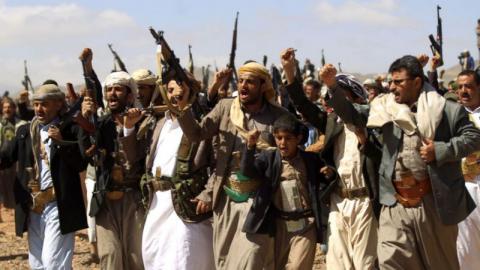British elite reap benefits of Saudi-led war on Yemen


UK councils and the military sector are profiting from the war in Yemen and the ongoing Saudi-led campaign in the impoverished state, Labour councilor Maya Evans told RT. Evans even went on hunger strike in protest.
Speaking to Afshin Rattansi on Going Underground, she said that, while the two week hunger strike may seem “severe,” the situation in Yemen has reached a state of “dire emergency.”
Due to the Saudi-led military campaign – ongoing since 2015 to reinstate ousted leader Abdrabbuh Mansour Hadi – some “14 million are in a state of famine, five million at risk from cholera, and 2.2 million have malnutrition.”
The councillor and anti-war activist says she felt compelled to resist as both a citizen and elected representative of the UK, which has been arming the Saudi Kingdom despite the bloody war. Within the first year of the bombardment, the UK provided £3.3 billion worth of arms to Saudi Arabia, 30 times more than they had before the conflict broke out.
She pointed out that while the UK has historically been quick to declare war against nations it “deems undemocratic,” it actively supports Saudi Arabia, turning a blind eye to the country’s undeniable track-record of “repressing democracy and outright violence.”
While the UK government continues to impose austerity measures at home, councils have been able to find the funds to invest hundreds of millions of pounds in private weapons manufacturers profiting from the humanitarian crisis in Yemen. Freedom of Information requests revealed that council pension funds have a large number of shares in major weapons manufacturers such as BAE Systems, Airbus, Lockheed Martin, Raytheon and Northrop Grumman.
Meanwhile, Evans enthusiastically supports the idea of a Corbyn-government introducing legislation to convict “war-criminals” reaping financial benefits from the war.
One figure who has benefited financially from the crisis, according to Evans, is Prime Minister Theresa May’s husband, whose employer Capital Group owns a large amount of shares in a weapons manufacturer that supplies the Saudi military. The company’s shares in Lockheed Martin, an arms-dealer who produces laser-guided missiles such as the one that blew up a bus full of school children in Yemen last year, was worth about $6.5 billion as of last March.
AFP.

Paris — The French humanitarian organization Acted announced that it has delivered cash assistance to nearly 89,000 people affected by displa…

Sana’a — Fuel and food imports into ports under the control of Yemen’s Houthi movement on the Red Sea have continued to fall for…

ADEN — Yemen Airways, the country’s national carrier, announced it will resume flights between Aden and Abu Dhabi beginning in January…